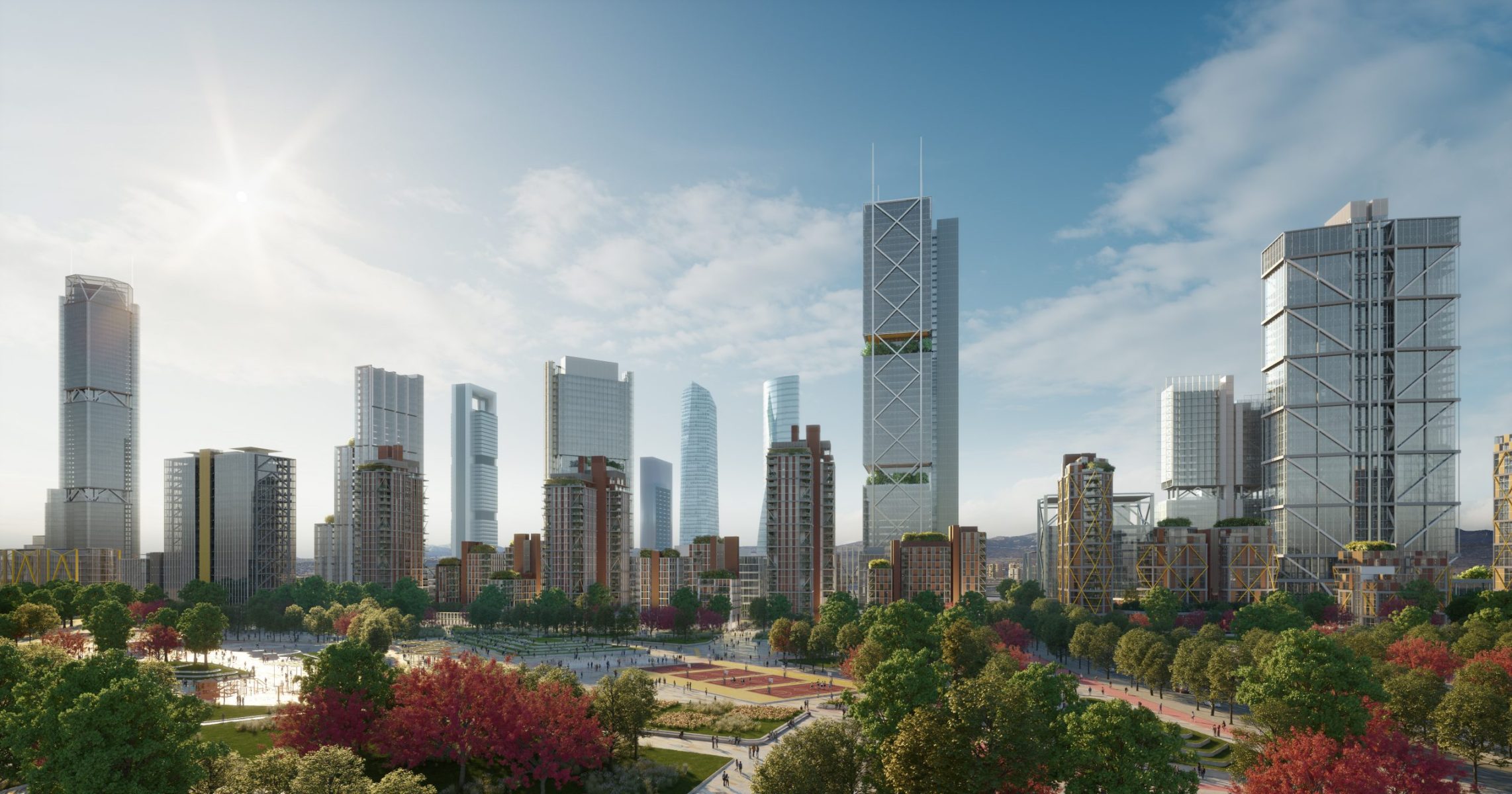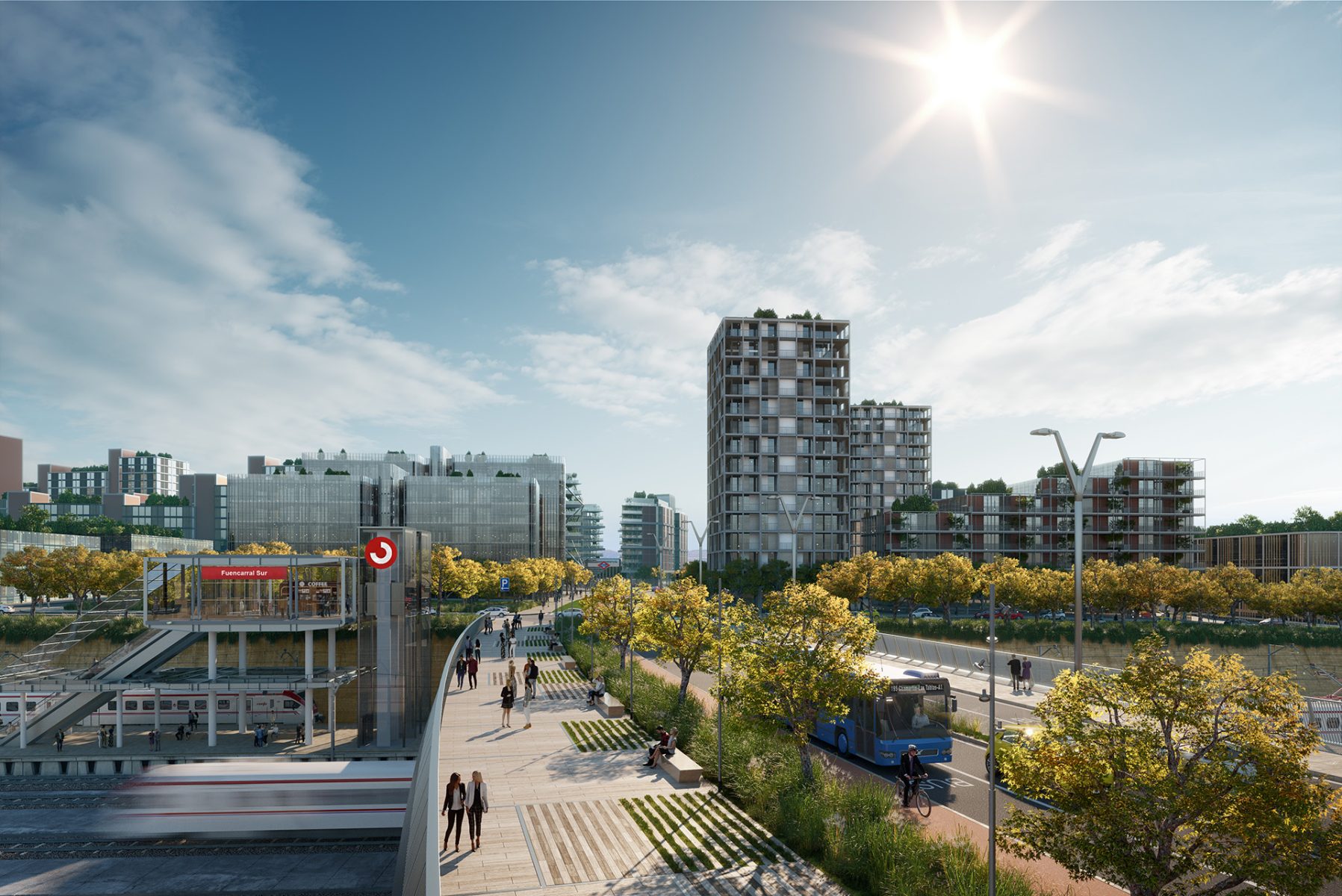5 October 2021
for Madrid Nuevo Norte

The recognition of the project’s commitment to sustainability by the two most prestigious international marks positions Madrid Nuevo Norte as one of the most sustainable urban development projects in the world and the most advanced on the continent.
Madrid Nuevo Norte, the most important urban regeneration project currently underway in Europe, simultaneously received pre-certification for Gold-level LEED Communities Plan and Design and provisional certification for BREEAM ES Urban Design 2020, the two most prestigious sustainability marks worldwide. These certifications make Madrid Nuevo Norte an international pioneer, as Europe’s first urban development project to obtain both provisional certificates, making it an international benchmark in the field of sustainable urban development.
This simultaneous achievement of both pre-certifications acknowledges Madrid Nuevo Norte’s firm commitment to sustainability from the very start and guarantees the project’s commitment to the highest sustainability standards during its execution phase, following the distinct and complementary criteria of the two international marks. While BREEAM focuses on defining strategic principles and requirements as a comprehensive guide for sustainability decisions, LEED emphasises the definition of quantifiable parameters to measure and evaluate each of the specific measures adopted by the project.
For Álvaro Aresti, president of Distrito Castellana Norte (DCN), the project’s main private developer and the company responsible for promoting the achievement of both certifications, “this recognition highlights all the efforts that DCN, its shareholders and all of the public administrations and companies involved in the project are making in Madrid Nuevo Norte, aware of the opportunity that this project represents to promote a new model of sustainable urban planning in the city and in the region of Madrid”.
Belén Piserra, DCN’s Business Director, emphasises that “the milestone of receiving pre-certification under the two most rigorous and prestigious international sustainability marks is a very important endorsement of our commitment to a 100% sustainable project and helps position Madrid Nuevo Norte as the most innovative and advanced urban development in Europe in terms of urban sustainability”.
The U.S. Green Building Council (USGBC), the U.S. institution that awards the LEED mark, values “Madrid Nuevo Norte’s commendable commitments to sustainability” and recognises the measures that this project has implemented since its planning phase as the key to the project’s ‘Gold’ level pre-certification, the second highest of the four levels awarded, guaranteeing that they meet the highest international standards of urban sustainability.
Madrid Nuevo Norte is a pioneer in the LEED certification process in Europe.After becoming the first urban project in the design phase in all of Europe to begin the process to obtain this prestigious seal in June 2020, the project continues to break new ground with the pre-certification that it has just obtained, making it the largest-scale project to achieve this and the second largest in general terms, only behind Siemensstadt, in Berlin.
The president and CEO of USGBC, Mahesh Ramanujam, sees the achievement of this pre-certification as “the commitment that the developers of Madrid Nuevo Norte have made to citizens to prioritise their health and prosperity in the coming decades, having understood the need to focus on developing smart, resilient and inclusive cities and communities to create a sustainable future for all.”
Kay Killmann, general manager of GBCI Europe, the organisation that manages LEED certifications on the European continent, says that the score obtained by Madrid Nuevo Norte in the pre-certification will place the project “in the top 25% of the most sustainable developments within the LEED for Cities and Communities programme worldwide and the most advanced in Europe”, once final certification is obtained. Killmann adds “Madrid Nuevo Norte stands out in Europe not just because of its size, but also because of its ambition in terms of sustainability,” which he sees as “an admirable combination”.
With its more than 230 hectares of mixed use land and major infrastructure of regional interest, Madrid Nuevo Norte has also become the first large-scale Spanish project to be provisionally certified under the new BREEAM ES Urbanismo 2020 standards. In July of last year, Madrid’s urban regeneration project was the first to start the certification process to qualify for this certification.
The director of BREEAM Spain, Javier Torralba, said that, after passing “the rigorous examination” required by BREEAM Urbanismo to obtain provisional certification, “Madrid Nuevo Norte is a worldwide benchmark in the application of best practices in environmental respect, people’s well-being and the promotion of the local economy”.
“Our evaluators reviewed the ecological, water and energy strategy in detail, in addition to other aspects related to governance and social and economic well-being, which will enable us to verify compliance with the key sustainability targets promoted by the project during its later execution,” explained Torralba.

The sustainability measures recognised by BREEAM and LEED cover environmental, economic and social aspects. Image: RSH+P
Founded in 1993 and originally aimed building sustainability, the U.S. Green Building Council (USGBC), the U.S. institution responsible for the LEED seal, has expanded the scope of its activity. In 2016, it created the LEED for Cities and Communities certificate to give public administrations and the other agents involved in the urban planning process the necessary framework to implement strategies related to energy, water, waste, pollution and carbon emissions. Along with these environmental factors, the rating system also addresses social and economic indicators.
In 2019, the agency launched the new certification, LEED V.4.1. Cities and Communities: Plan and Design, under which Madrid Nuevo Norte has been pre-certified. The main new development is the ability to certify projects at both the city and district levels in the planning and design phase, without waiting to complete the construction and operation of the development, to help create responsible and sustainable urban plans.
Its methodology assesses the sustainability of projects in nine categories, covering a variety of aspects including natural systems; mobility and land use; water efficiency; energy and greenhouse gas emissions; materials and natural resources; quality of life; and applied innovation, in addition to ensuring that the process is integrated into the rest of the city and prioritises the benefits for the region in which the project is carried out.
There are currently only about twenty LEED Cities and Communities v4.1 – Plan and Design candidate projects in the world.
Founded in 1990 in the United Kingdom, BREEAM was the first system created to assess sustainability in buildings. The certificate is managed by the Building Research Establishment (BRE), a non-profit organisation that promotes research and development of sustainable construction standards.
The aim of its BREEAM Urbanismo seal is to encourage more responsible urban planning and management through a comprehensive environmental sustainability certification, a tool to help developers and other planning agents to ensure, improve and independently measure the sustainability of their urban planning proposals.
Based in Europe, BREEAM adapts its certifications to the local regulations and conditions in several European countries, including Spain. The Instituto Tecnológico de Galicia (ITG) is the entity that has been exclusively licensed to operate the BREEAM environmental assessment methodology in Spain. This methodology is constantly evolving and being revised. The first version of the urban planning manual applied to Spain was published in 2012, and BREEAM revised it in 2020 to add new criteria, create a comprehensive guide for the design and management of decisions in large-scale urban planning projects, and better adapt its standards to the constraints of Spanish planning.